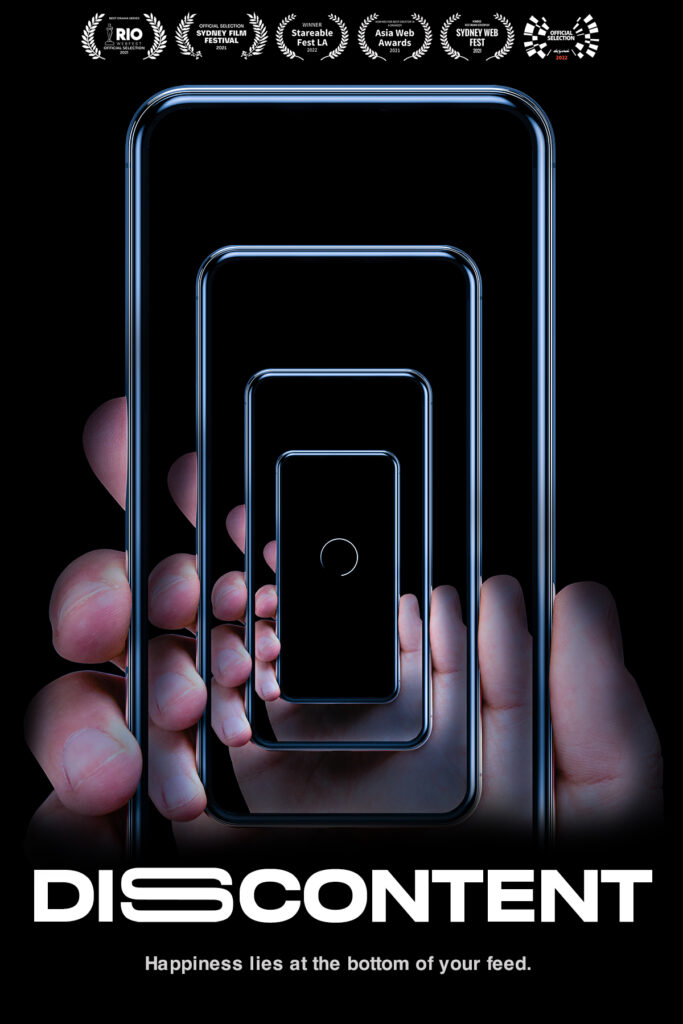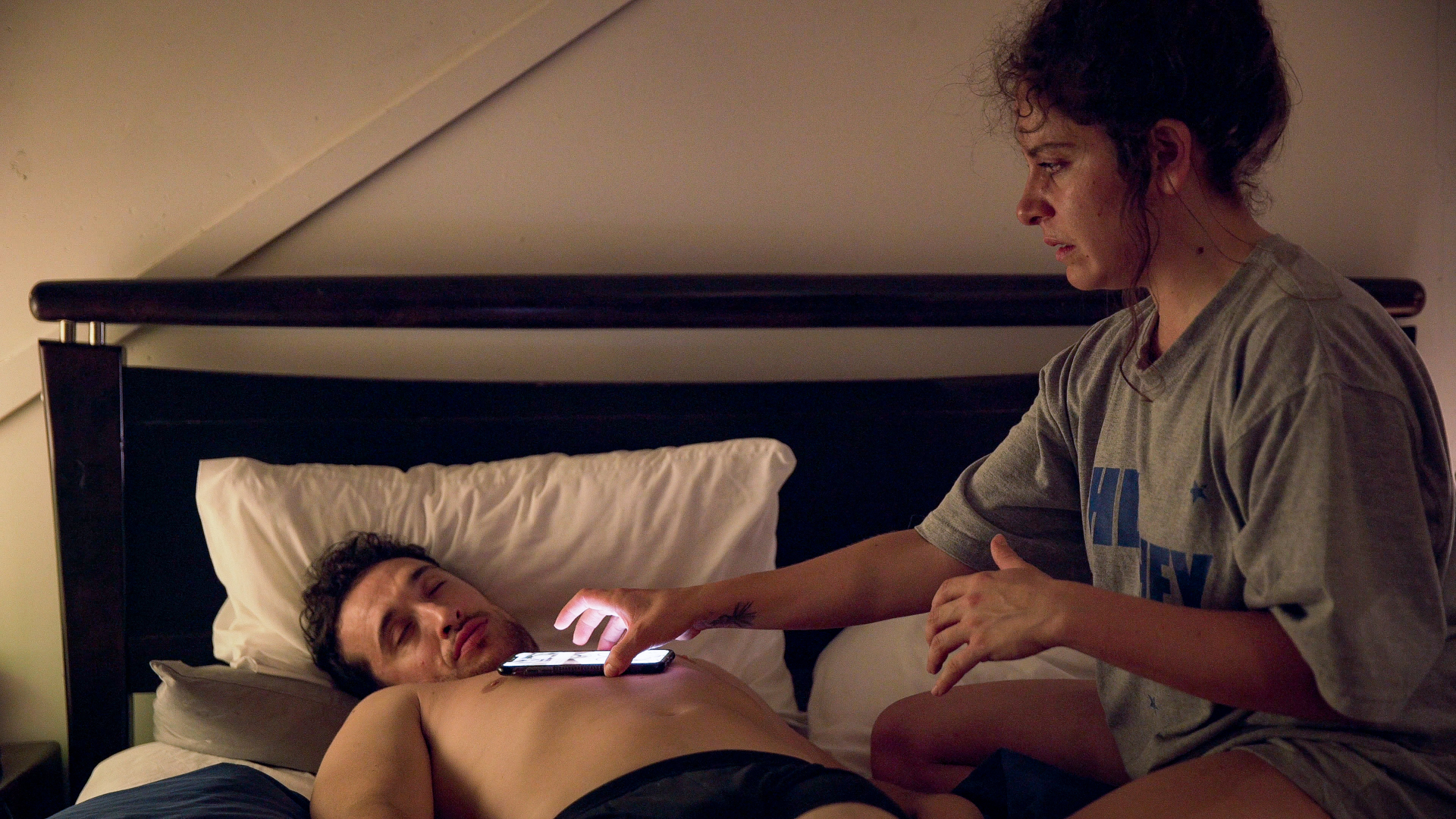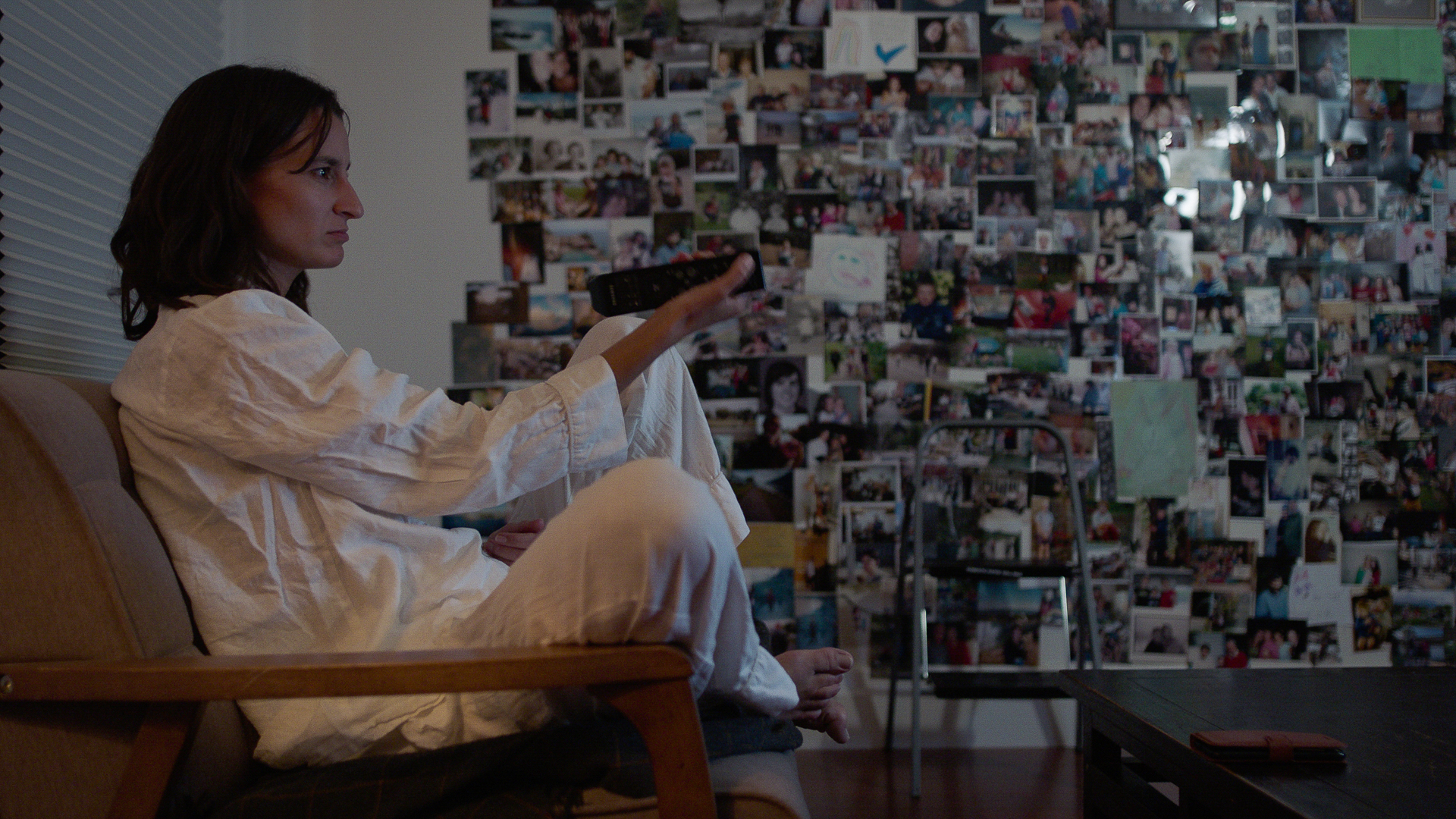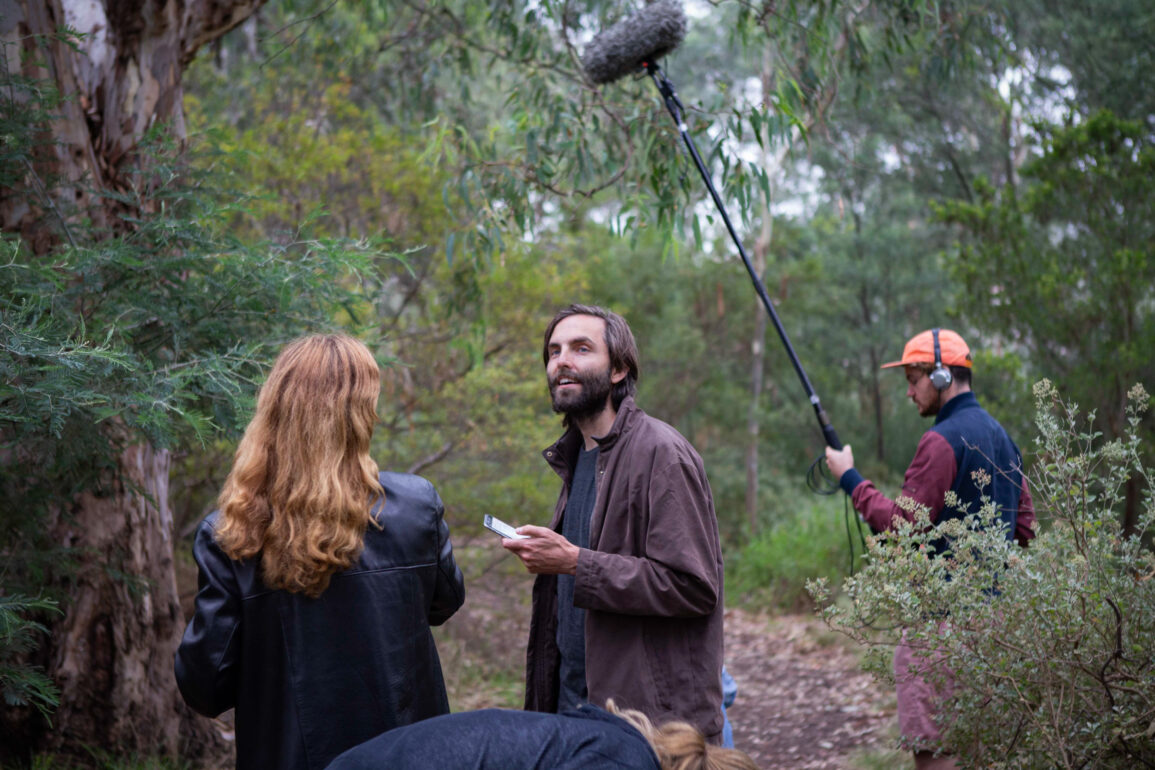Sam Rogers rollercoaster ride of a web series Discontent is a short-form look at a group of millennials linked to one another through their phones and social media. With a rip-roaring level of comedy, Rogers explores everything from sex, to romance, to a bizarre level of kleptomania, and finally to the life of an alien disguised as a woman. There’s a bit of everything in Discontent that eagerly holds a black mirror up to our addiction to our devices.
In this interview, recorded ahead of the series launch on YouTube, Sam Rogers talks about the inspirations for the series, the casting process, and the challenges he faces as a creative person working in Australia today.
Discontent is available to watch on YouTube right now.
There are five shorts which make up this series. How did you go about planning what kind of tone and narrative you wanted to explore in each one?
Sam Rogers: There were a few influences, like the opening of Gaspar Noé’s Enter the Void. When I saw that for the first time, and I was just blown away [by it]. I’d never seen that, the way that he did the point of view with the thoughts. It just felt really real. And I kind of always wanted to make something like that, because I’ve never seen it before. The last short was very inspired by Under the Skin.
I think I always knew that it was going to end with a dark, Black Mirror vibe. And then the earliest stuff, we would kind of start more comedy, and lighter. I think it was just a bit of an exercise in making something bigger than shorts that I made previously, and kind of experimenting with form. And have it be an anthology to be able to do that, so I could make a larger project, but also kind of experiment.
Was it a challenge that you set for yourself to be able to tell a story across different styles?
SR: I’m not sure if I really set out for it to be a challenge. It kind of just happened like that when I was thinking of different ways to explore the idea of how Millennials are addicted to their smartphones. And people, like just normal people living normal lives and how and how the Internet and smartphones affect them.
Were they informed by real stories that you had been either told or experienced yourself?
SR: The first episode, I just found it so funny, the idea of someone that would use online classifieds not to actually really be interested in buying the products, but to connect with people. I just love the idea of ‘how you can kind of get invited into someone’s home with the pretense that you’re buying their product’. And with the others, Tinder and nervously waiting for a Tinder date was definitely an experience and being a cheapskate and not signing up for subscriptions, or using someone else’s Netflix password. Definitely [that] was a true experience.
And then Millie in the second episode, she’s just addicted to Instagram or social media, and that’s still true today. I think I’ve gone off Instagram a little bit now. It’s crazy how the journey that you have with social media, or that I’ve had over the last, let’s say, 10 years, since smartphones have been kind of popular. I feel like some people, they’ll delete the app and then go back on. And it’s a very hardcore kind of relationship. I’ve been pretty moderate kind of person in that regard. But it’s interesting to think about how our relationships with social media have progressed over the last 10 years.
Did it always start off with the notion of doing it as a web series?
SR: When I started writing it, which was probably about three years ago now, it took a lot longer than what I thought it would take to me. I think the funding landscape had kind of shifted in Australia from shorts to web series. And it kind of seemed that as an emerging filmmaker, that was the kind of thing to do. So that was a big intent of making a web series. I had a few friends from film school that were doing the same thing. I think that kind of pushed me along as well. And I think the idea was to try and get completion funding, like make it all yourself and then get completion funding at the end. And that would be a kind of way to get a foot in the door of the very competitive Australian film industry.
How’s that process been for you?
SR: Oh, it’s been very eye opening. I think something that I didn’t consider enough was what they really drill in, they really do hammer it home – Screen Australia – is pathways to audience. I think when you’re starting out as a filmmaker, or me anyway, you’re kind of not wanting to think about that. Because it seems like all you’re trying to do is just express who you are. But looking back, undertaking a web series, it’s a huge undertaking. And I think it definitely pays to be a bit more strategic in terms of intent. So definitely moving forward, the big lesson I’ve learned is, you’ve really got to think about a pathway to audience before you get into production, or even before you start writing, if you want to get funding. That’s my experience anyway.

Now filmmakers have to become almost like small business owners, thinking about every step of the process. Is that something that is taught at all or [is] guidance given that if you’re going to make something, that you’re going to need to be part it every step of the way?
SR: I went to film school and did a bachelor’s degree. And we didn’t get taught any of that. It was all just writing and directing. I find it interesting that now we have Facebook, Twitter, social media, I think especially for a web series, I do really have to be in that space if I want to reach an audience. We’re getting up to release now, and so I’m starting to make the teasers and trailers on all the content that comes with that. I’m really enjoying making all of that stuff that can be eye catching, and that can kind of cut through.
I think maybe because Discontent is about that as well, it kind of feeds it. I guess it’s we live in a different time now. Before, you made a film and then it would get thrown to someone else now. I think that’s the downside of all this, the internet, is that it’s very self-serving. It can feel like it’s just ‘me, me, me’. And it’s not really about the collective, it’s about the individual. And I think that’s a little dangerous.
It can be. There’s something that’s very meme-able about some of the moments in Discontent. I imagine that probably helps with the marketing of it, where you can take a snapshot and then be able to share it that way. Is that something that you intend on doing as well?
SR: Absolutely. I’m gonna be making so much, and just pumping it out, and annoying everyone. And looking at all the metrics and seeing what works and what doesn’t, and what time to post. It’s a whole other project, really. And if I had some money, I would work with someone else. But it’s very consuming, but I’m enjoying it. But at the same time, I’m kind of feeling like, it’s not giving me enough space to work on my next project. I feel like once I’m done making all the strategy and all the content, then I can pick up on the project that I’ve been writing. I guess it’s also like how much you want to put into something. I could spend months and months and make so much content, but where does it [stop]?
How do you find that balance of planning everything and then maintaining a creative self as well?
SR: It is kind of creative what I’m doing now in this marketing stage. I’ve been writing a feature for a little while, and I’ve been finding myself a little bit stuck with it. So this is kind of just an easy scapegoat. Once this is done, I can get back to it. It’s kind of nice to have a bit of a break from writing. It’s funny, I think, as a filmmaker, if you want to be successful, you have to be pretty hard working. You have to be quite strategic I think in terms of where you put your resources.
Let’s talk about the casting. Everybody matches their characters so perfectly. Can you talk about how you went about casting each of the characters?
SR: The first one, Sandra [Kathleen Lee], she’s a friend that I went to film school with. She made her own web series called Sex and Death. I’m good friends with her, and I wrote that part especially for her. I don’t think anyone else could have played it as well as she could. I think she nailed it, and she knew exactly what to do. For Milly [Maria Angelico] in the second episode, she’s kind of in the community of filmmakers that I work with, and I wanted to get a bit of a name. She’d been in Sisters on Channel 10, and Stateless and she’s on The Newsreader. So it was a little bit about trying to find someone that had a bit of status. And I think Maria is just a super fun person and the character required that. The kind of couple of they are, it’s a bit of a dumb couple, for lack of a better word. And I thought she would just play to the comedy really well.
And then Isabella [Giovinazzo, plays Apple] was another friend from film school. She’s in the third episode on the phone point of view. She’d been on Home and Away. The whole casting process was just casting to my means. We didn’t really have a budget. I knew Isabella from film school. And I knew Kathleen from film school. Nick [Nicholas Jaquinot, plays Archie], in the fourth episode, I think I just kind of looked at other stuff that he’d done, and he seemed right for the role and kind of could play that comedy really well.
And then Chloe [Martin, plays Maya], she was in the last episode, she was in a web series called Dee-Brief, and I thought she was really strong. And she did a bit of work with my producer, Tobias [Willis] on some of his videos, and she’s so intelligent, and she brought so much to role. She’s had so many ideas, because there’s a lot of interpretation with that last episode, because it’s quite different.
I’m always looking to cast female actors and write female roles. We still very much live in a patriarchy, and I think, if possible, I prefer to show female characters. Even write a male character and then cast them as female.


The dialogue is so brilliant. I’m curious how you go about creating dialogue that is in the moment? Was there any room for improvisation? The dialogue is so personality driven.
SR: Always room for improvisation. It didn’t feel like there was a lot of improvisation. I think you just it’s just about finding the character’s voice. It was definitely a credit to the actors. They’re all so talented. It wouldn’t have quite been the same if they weren’t, I think. It was quite a challenge to set up each [short]. Basically it’s just a bunch of shorts, really. So you starting from the start every time and having to set up the character in the problem in a very short amount of time. It was a good exercise in short filmmaking anyway.
What lessons will you take on board for a feature film?
SR: I think sitting on the script a little bit longer. I think throughout my whole career, writing I’ve always found the hardest, and you just want to make the thing. It’s always been a better time when I’ve gone to get more feedback or paid to get more feedback. I’ve just sat on the idea more and really interrogated everything. And so that’s number one. And number two, is just thinking about an audience and how to reach them. And thinking about genre a little bit and getting out of drama and going more towards genre because genre has a niche and it has an audience. And it seems like from what I’ve been hearing, drama is a bit of a dirty word in the in the market of filmmaking, you can say anything but use the word drama.
Is there a particular genre that you’re interested in playing with?
SR: More horror, or a psych thriller. I used to not really be into horror at all, and kind of be terrified by it. But I think I’m more interested in horror now. We [are] living in horrific times. And so it’s kind of seems like the right genre to express ideas within. I think maybe, previously, why I didn’t think horror was that great was because it seemed like it was just like a monster film, and there wasn’t any kind of intellect behind it. But more so I think I’ve realised is that there is so much intellect and metaphor that can be placed in horror that I that previously thought we’ve just reserved for the drama or for other kinds of genres. I think why I’m interested in horror is because I think it’s achievable on a low budget and it can reach an audience and it can be marketable, as opposed to, let’s say, a drama.
There are horror festivals all around the world. And, in particular, in America, where anything that falls under the horror genre, there is a huge audience for it. So you have that inbuilt audience there. It’s almost a career starter as well. You look at all the great directors, and what were their first films? Horror films. And then they progressed from there. I’m excited to see what you do in that field.
SR: Thanks. I made a short recently, and that was a horror film. That’s the start of my horror journey.
As you embark on your career, do you have a body of work in mind? Is there something that you want to achieve with each of the projects that you do?
SR: I mean, it kind of comes down to budget. The first feature has to be low budget, or no budget, depending how it turns out. I don’t know. I haven’t really thought about the first one. I want to get my first one down and see. Getting the first one done will be such an undertaking, I haven’t thought about second or third or fourth.
I’m excited to see where you go as a filmmaker. But I’m curious for you, does Australian culture and identity play into who you are as a filmmaker at all? Is that in your mind?
SR: It’s a tricky one. I’m definitely thinking about Australia and about stories that are about Australia, but sometimes I feel like we’re just another country in the west and we don’t have an much of an identity. And so the stories that I make could be placed in any English speaking western country. But I’m very interested in Australia, and when I think about Australian films that I’ve enjoyed the most, I think those have been the ones would have been uniquely trying to describe something about Australia, like The Nightingale or Nitram or James Vaughan’s Friends and Strangers. I feel like Friends and Strangers, it’s very uniquely Australian. Clearly, he’s trying to talk about Australian things, but even if you take out all the themes of the film, and you just look at the characters and their dialogue, it couldn’t be anywhere else but Australia, the way that they talk. Australia is such an interesting problem, as a concept. I don’t see myself relocating anywhere anytime soon.



